The 12 best private browsers for secure browsing
It seems like everyone on the internet wants to know more about you, from where you live to what you buy. Private browsers help limit the data you expose. Read on for an overview of the best private browsers. Then, download a trusted secure browser to close the curtains on snoops and hackers.

So you wake up in the middle of the night, dying of curiosity about what’s in cat food. You Google it, get your answer (not mice), and go back to sleep. Then, for weeks, you’re seeing ads for kitten kibble all over the internet. You don’t even own a cat.
If that sounds familiar, you’re not alone. Many people find this kind of targeted advertising annoying and intrusive. It’s a reminder that your online activity is constantly tracked, stored, and monetized. That’s where private browsers come in.
Read on to discover which anonymous browsers offer genuine, comprehensive privacy protection.
Editors’ note: The content below reflects the opinions of Norton editors and product experts. While we strive to provide accurate and up-to-date information, products, features, and capabilities may change over time. For the latest details, refer to a company’s official website before downloading or purchasing any product.
What do private browsers do?
Private browsers, also known as secure browsers, help you surf the internet more safely by limiting the information you expose to third parties, like marketers, Google, and even hackers. These digital voyeurs gather data like what sites you visit, what you buy, your location, browser settings, device details, and much more.
Meet Norton Neo: Your new AI browser
Built from the ground up with AI, Norton Neo doesn’t just browse — it thinks. Blending smart navigation, conversational AI, and classic search, Neo is the vanguard of the AI revolution. Explore tomorrow's browser, today.
The best browsers for privacy
The private browsers on the market all offer a different combination of privacy features and customization options that help reduce your digital footprint. Which one is “the best” depends on your individual needs and preferences. Below is an overview of some popular safe browsers.
Norton Private Browser
Norton Private Browser is a security-focused browser developed by industry-leading cybersecurity experts at Norton. Featuring built-in anti-tracking, anti-fingerprinting, and protection against malicious sites and online scams, it’s been designed from the ground-up to help keep you safer — and more private — online. Built on Chromium, it offers a familiar browsing experience and uses Bing as the default search engine.
Norton Private Browser is especially notable for its AI-powered Web Shield feature, which leverages Norton’s unparalleled Cyber Safety expertise to help protect users from malware, phishing attempts, and spoofed websites. It can even detect sophisticated spyware hidden in URLs and downloads — all without sacrificing usability.
Norton Private Browser’s key features
- Helps block ads through the cutting-edge Privacy Guard feature.
- Helps block trackers.
- Helps detect and block phishing attempts.
- Helps block malware and spyware.
- Alert users if they land on a potentially malicious website.
- Includes anti-fingerprinting protection.
- Lets you choose your preferred search engine from popular providers.
- Helps prevent apps and malware from viewing, changing, or deleting saved passwords.
- Includes a password manager.
- Keeps browsing faster and smoother.
Disadvantages: Norton VPN is sold as a separate product.
Norton Private Browser is available on Android, iOS, Mac, and Windows.
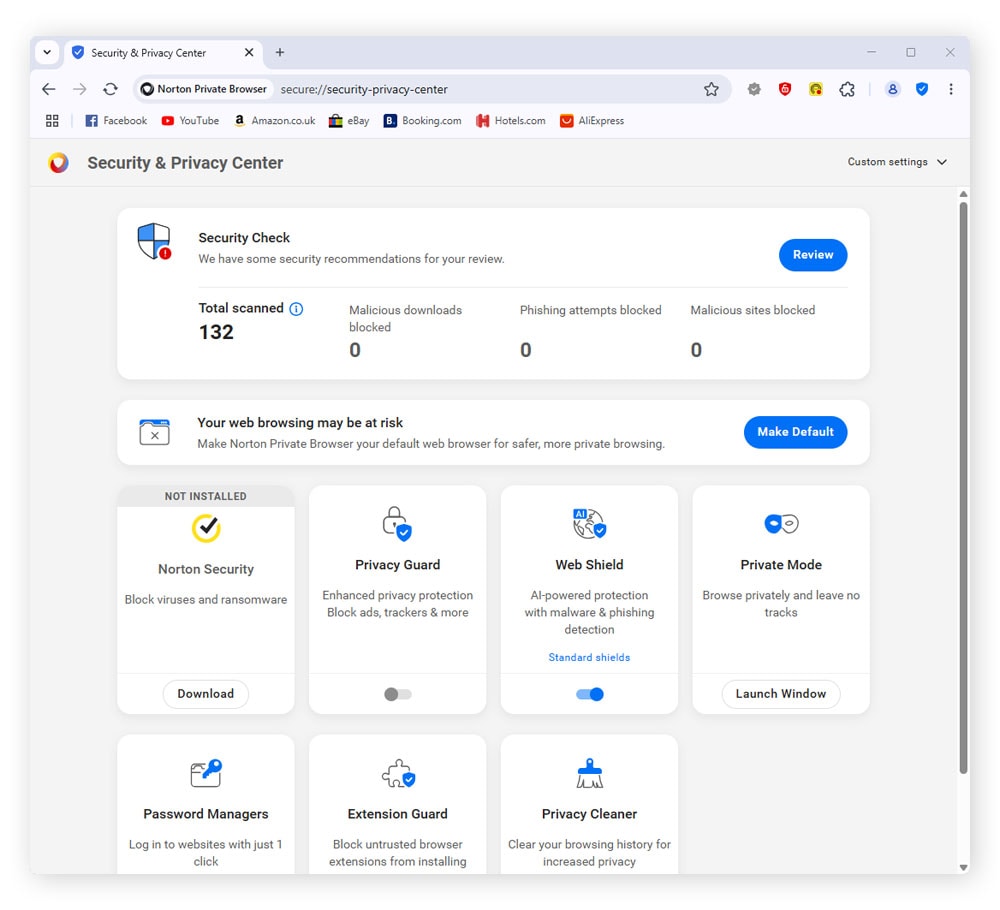

Brave
Brave is a privacy-focused browser built on the Chromium engine that helps block ads and trackers. For users who don’t mind an ad or two, Brave offers a built-in cryptocurrency reward system that grants crypto “basic attention tokens” for watching ads. This private browser defaults to its own independent search engine, which is great for users concerned about privacy issues potentially associated with Google or Bing.
Brave browser’s key features
- Blocks trackers and fingerprinting.
- Blocks ads.
- Uses an independent search engine.
- Features a built-in AI assistant, Leo.
- VPN integration is available.
- Blocks “Accept cookies?” pop-ups.
- Removes URL tracking parameters.
Disadvantages: Brave’s VPN costs extra, and in my experience using the browser, it sometimes causes some web pages to malfunction. In addition, Brave search results are often geographically irrelevant — although this could be seen as a plus by privacy mavens, despite the inconvenience.
Brave’s browser is available for Android, iOS, Mac, and Windows operating systems.
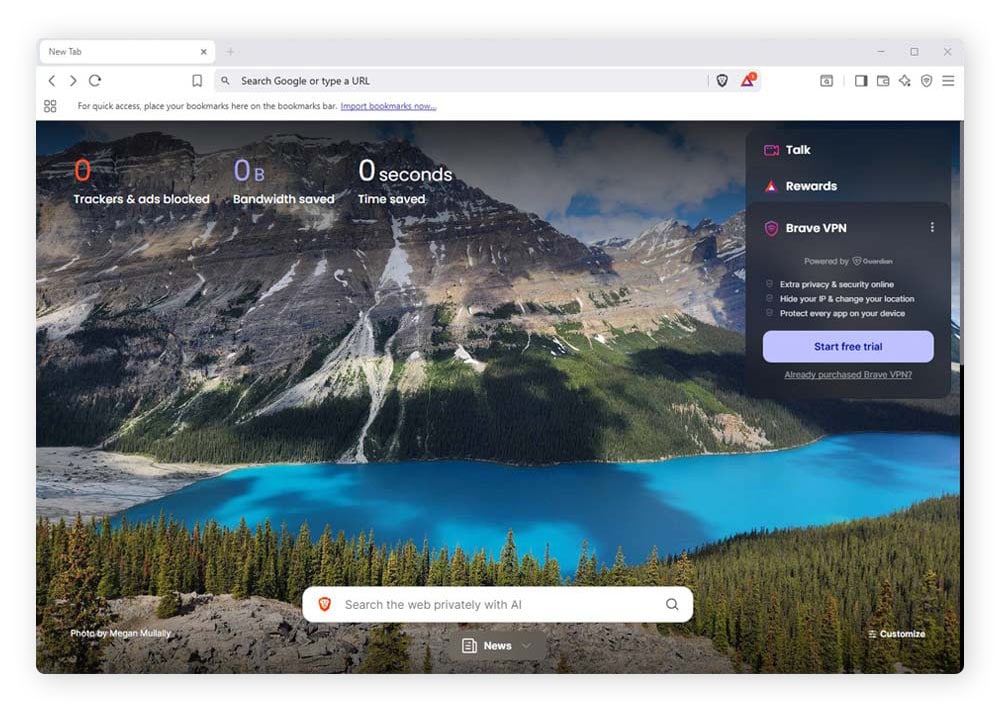

Avast Secure Browser
Avast Secure Browser is a security-enhanced browser developed by Avast, a leading European cybersecurity company. Built on the Chromium platform, it combines the familiarity of a standard browser with advanced security features, including anti-tracking, anti-phishing, and built-in ad blocking. The default search engine is Bing, but this can be changed in the settings.
Avast Secure Browser’s key features
- Helps block trackers and fingerprinting.
- Helps block ads.
- Helps block phishing attempts.
- Integrates well with Avast antivirus products.
- Helps block malicious websites.
- Forces websites to use encryption.
- VPN integration is available.
Disadvantages: The VPN included in Avast Secure Browser is a paid feature only available to subscribers of Avast Secure Browser Pro.
Avast Secure Browser is available on Android, iOS, Mac, and Windows.
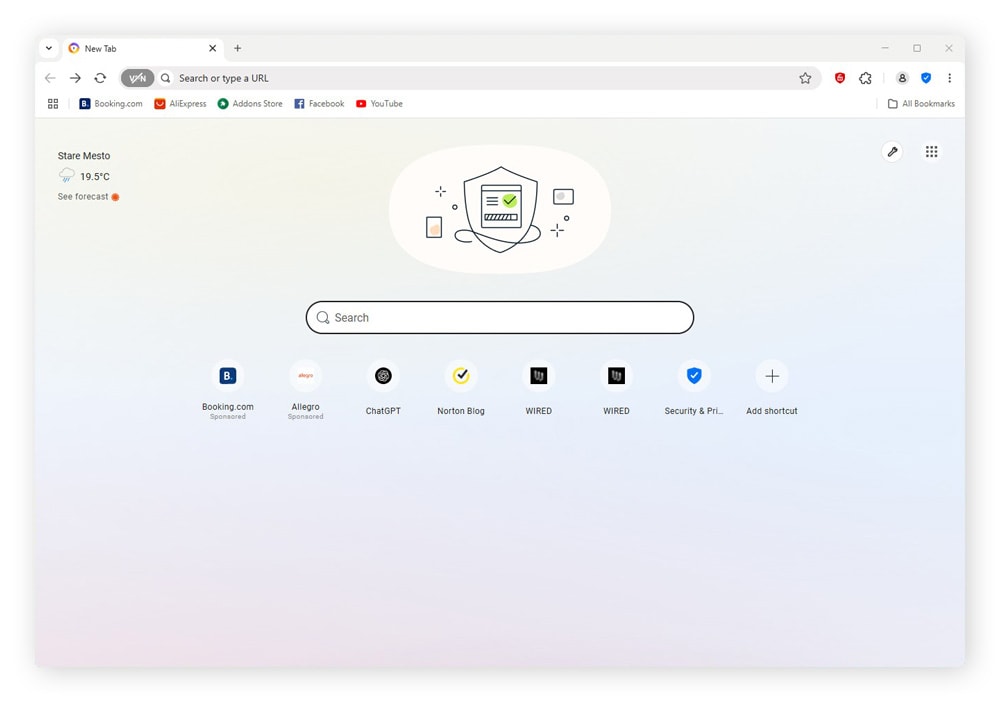

DuckDuckGo
The DuckDuckGo browser is a well-established private browser designed to block trackers, enforce encryption, and integrate seamlessly with the DuckDuckGo search engine — a safe alternative to Google. To help prevent online profiling, it avoids storing unnecessary user data and automatically deletes your search history after each browsing session.
Unlike many browsers in this article, DuckDuckGo is not fully built on Chromium. On mobile devices, it relies on the operating system’s native WebView: Android System WebView on Android and WKWebView on iOS. On desktop, it uses the system’s embedded rendering engine as well: WebView2 (based on Chromium) on Windows, and WKWebView on macOS.
DuckDuckGo browser’s key features
- Blocks trackers.
- Offers anti-fingerprinting protection.
- Blocks ads.
- Uses the independent DuckDuckGo search engine.
- Enhances encryption.
- Offers email protection features.
- Includes an integrated (paid) VPN.
- Automatically selects the most private option from cookie consent pop-ups.
- Allows users to delete recent on-device browsing data in one click.
- Includes an AI chat feature.
- Allows you to manually choose which country to browse from.
Disadvantages: DuckDuckGo’s VPN costs extra, and the browser doesn’t allow extensions due to the possible privacy risks they pose, which may inconvenience some users.
The DuckDuckGo browser is available on Android, iOS, Mac, and Windows.
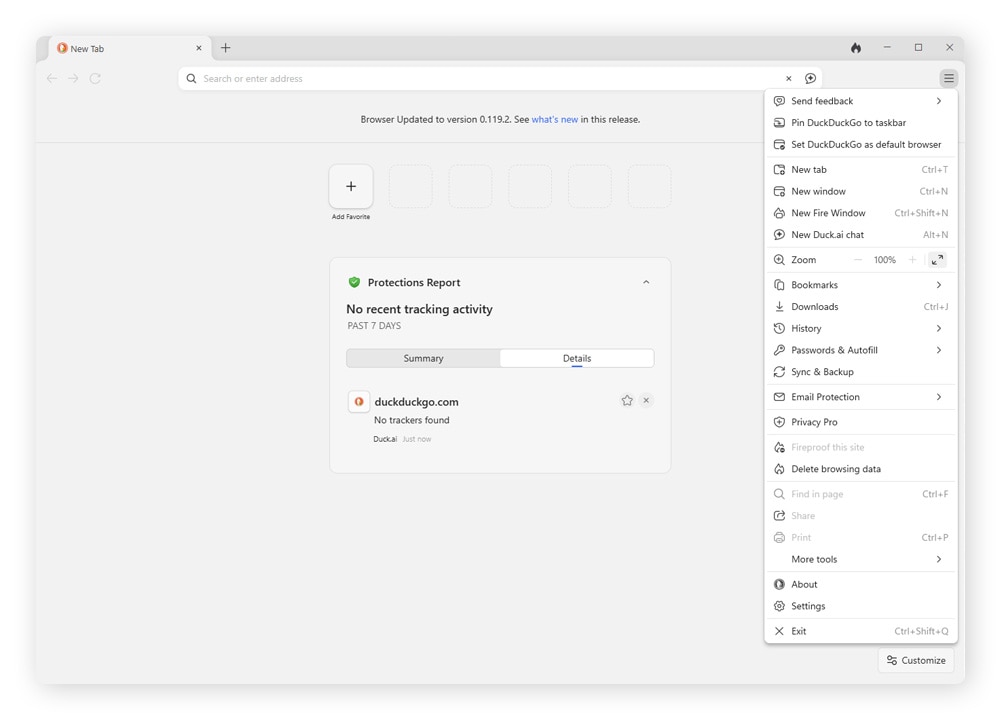

Epic Privacy Browser
Epic Privacy Browser is a Chromium-based browser with strong anti-tracking features designed to block ads, scripts, and fingerprinting. It includes a free, built-in proxy server for additional privacy.
Epic Privacy Browser’s key features
- Blocks trackers.
- Blocks ads.
- Protects users from cookies and fingerprinting.
- Offers a free encrypted proxy VPN.
- Unblocks many websites.
- Displays who is attempting to track users.
Disadvantages: In the author’s experience, Epic can interfere with the functionality of certain websites, and its interface feels relatively basic. However, given Epic’s strong emphasis on privacy over aesthetics or advanced features, this trade-off may be acceptable for users prioritizing security above all else.
Epic Privacy Browser is available on Android, iOS, Mac, and Windows.
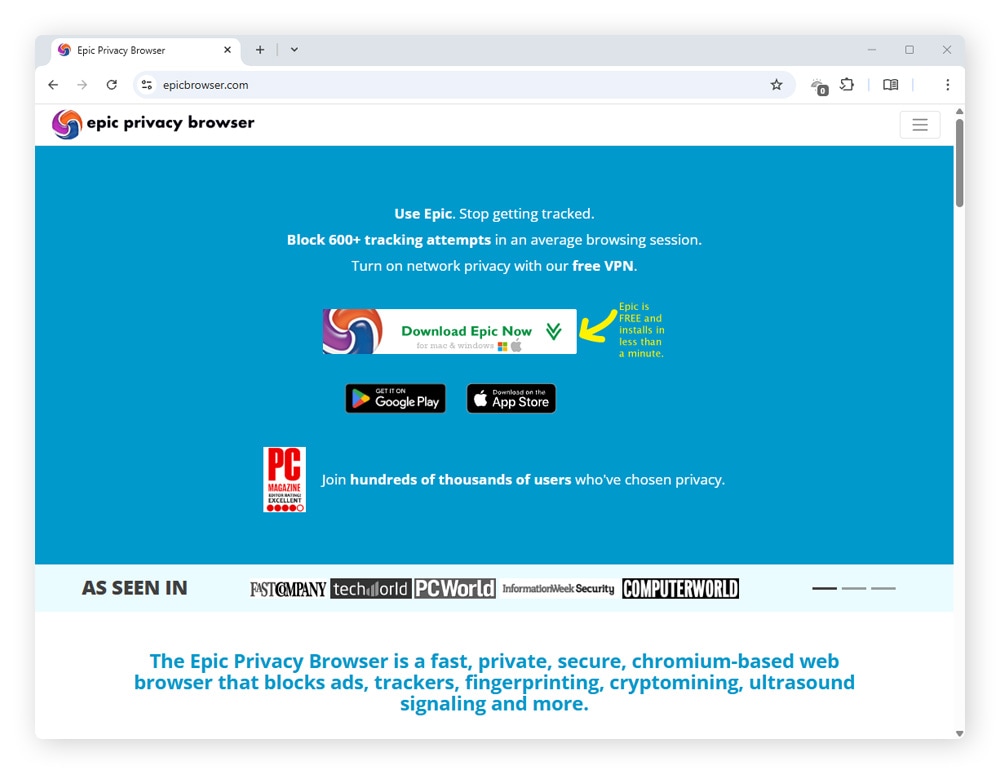

Mozilla Firefox
Firefox is a free, open-source browser developed by Mozilla. It’s known for its wide range of privacy features and customization options, along with its strong commitment to user rights and transparency. It supports a vast library of extensions and prioritizes tracking protection. Its Total Cookie Protection prevents cross-site tracking by storing cookies in separate “jars” for each website, a major privacy advantage.
Firefox’s key features
- Blocks trackers.
- Blocks ads.
- Prevents some fingerprinting.
- Offers cookie protection.
- Offers DNS over HTTPS (DoH) encryption.
- Blocks phishing attempts.
Disadvantages: Some users report slow performance and occasional page rendering issues. Firefox may consume more RAM than certain competitors like Brave.
Mozilla Firefox is available on Android, iOS, Linux, Mac, and Windows.
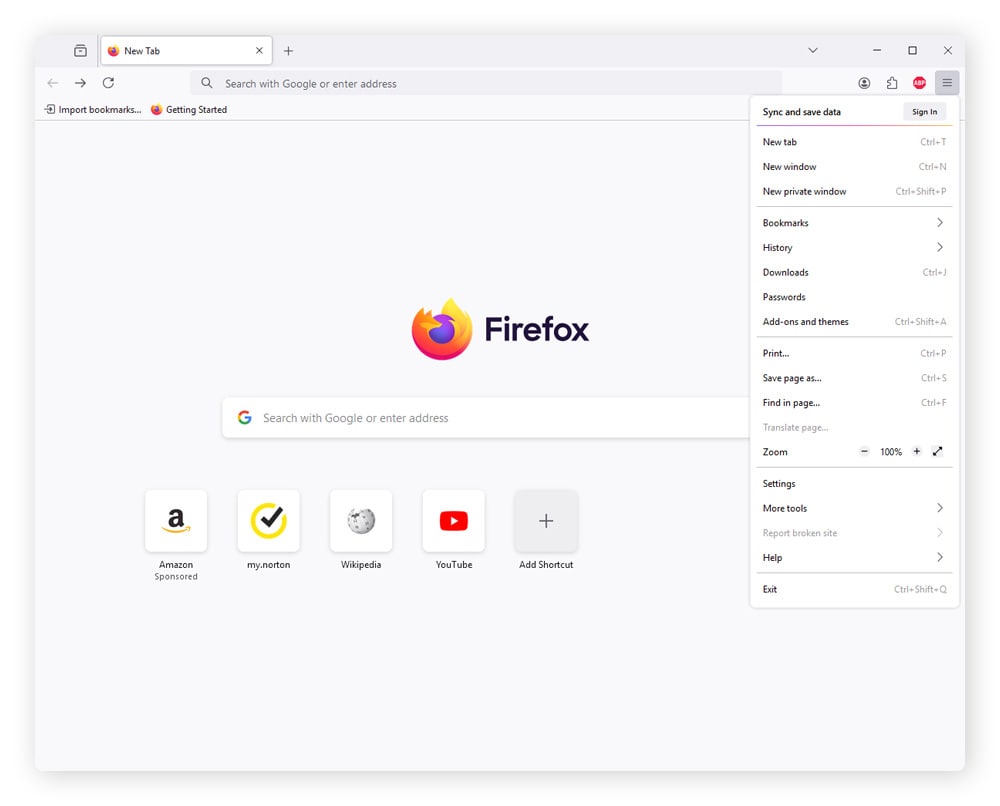

Waterfox
Waterfox is a free, open-source fork of Firefox focused on privacy and performance. It’s known for disabling telemetry and supporting legacy Firefox extensions. Waterfox appeals to many users who prefer a minimalist, lightweight, independent alternative to mainstream browsers.
Waterfox’s key features
- Offers advanced tracking protection.
- Protects against fingerprinting.
- Features Oblivious DNS that hides your browsing from your ISP.
- Includes container tabs for color-coded tab organization.
- Telemetry is disabled, meaning Waterfox only collects limited data.
Disadvantages: Waterfox is not available on iOS.
Waterfox works on Android, Mac, Linux, and Windows.
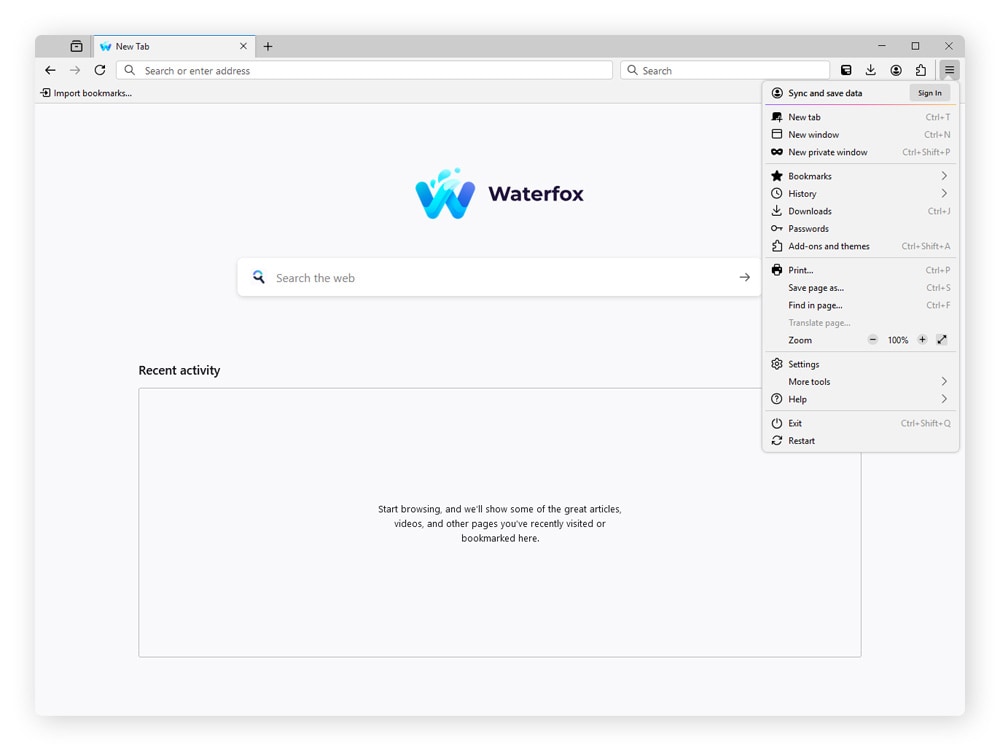

Tor Browser
Tor Browser, or The Onion Router, is named for its layers of encryption. It’s a privacy-centric browser that routes traffic through the Tor network to anonymize user activity. It’s widely used for secure and anonymous browsing and to access the dark web. While highly private, its limited functionality and slower speeds can make it somewhat inconvenient for everyday use.
Tor defaults to the DuckDuckGo search engine, although users who wish to access dark web sites (known as onion sites) may prefer to use a dark web search engine like Torch.
Tor’s key features
- Blocks trackers.
- Prevents some fingerprinting.
- Routes traffic through the Tor network.
- Prevents IP address exposure.
- Enforces HTTPS encryption.
- Does not store browsing history.
- Allows users to block JavaScript.
- Grants access to the dark web.
Disadvantages: Tor is slower than other private browsers, and many websites may not function properly.
Tor works on Android, Linux, Mac, and Windows. According to Tor’s website, iOS users will need to download an onion-adjacent app, like Onion Browser or Orbot, to access the onion network.
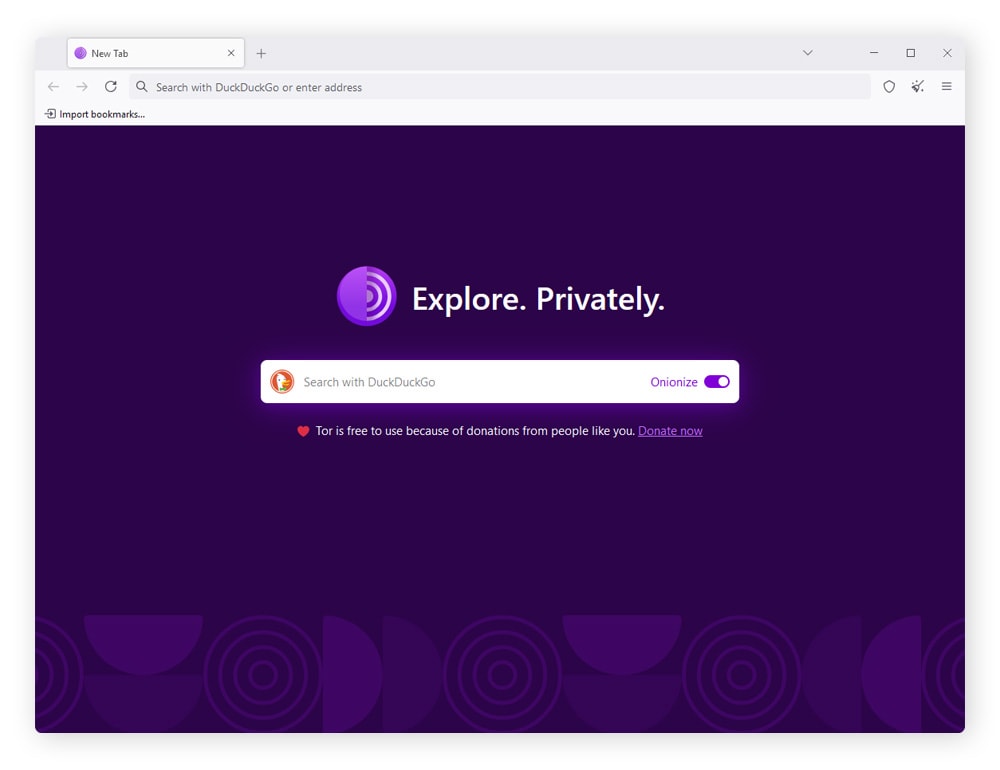

Mullvad Browser
Mullvad is a privacy-focused browser developed in collaboration with the Tor Project. Unlike the Tor browser, it’s designed to work with a VPN instead of the Tor network, although using a VPN isn’t necessary for the browser to work. Mullvad minimizes fingerprinting and tracking risks, and is a popular option for users who want some of Tor’s anonymity benefits without the limited functionality or slower speeds. Mullvad is based on Firefox and defaults to the Leta search engine.
Mullvad browser’s key features
- Blocks trackers.
- Prevents some fingerprinting (all Mullvad users have identical fingerprints).
- Browsing history isn’t saved, and cookies are discarded after each session.
- Allows users to disable JavaScript.
- Defaults to an independent search engine.
- Comes with uBlock Origin built in.
- Allows users to “reset their identity” with the click of a button, which clears browsing data.
- Limits telemetry.
- Offers HTTPS-only mode.
- Offers DNS over HTTPS encryption.
- Uses the Mullvad Leta search engine by default.
Disadvantages: The browser’s strong privacy features may make some web pages malfunction. However, adjusting the security level results in constant warning messages about potential security risks (even when visiting Mullvad’s home page). The VPN costs extra.
Mullvad is available on Android, iOS, Linux, Mac, and Windows.
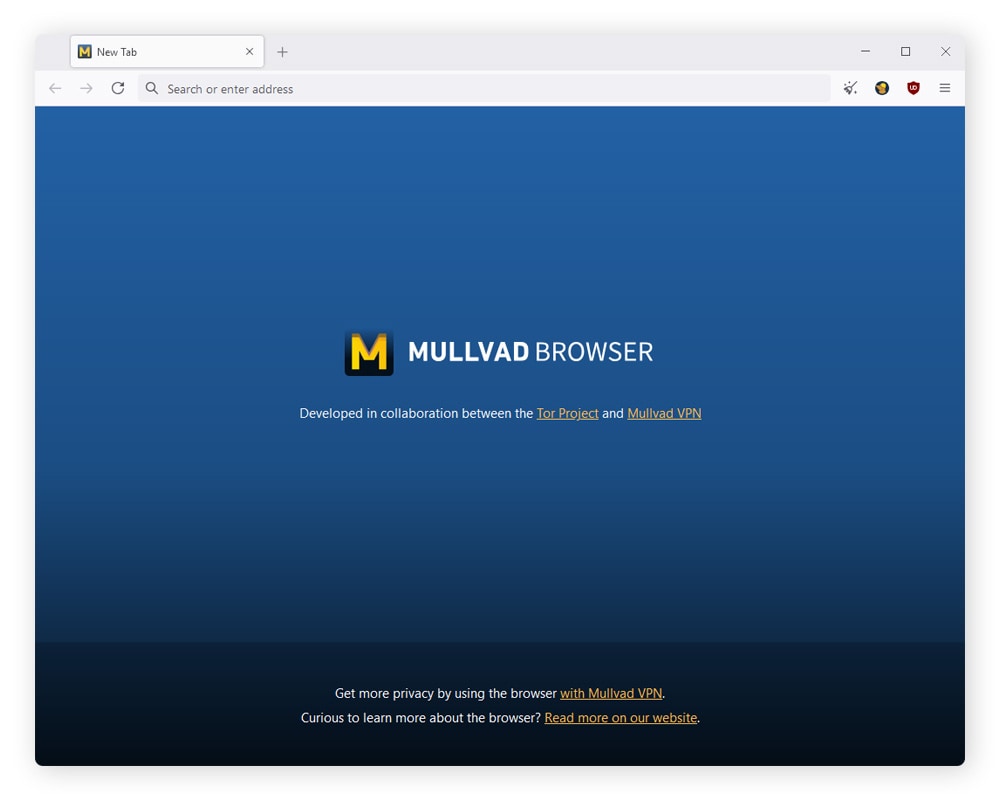

Puffin Incognito Browser
Puffin Incognito Browser is a cloud-based browser that offloads web processing to remote servers, improving speed and security while reducing local resource consumption. The team behind Puffin positions itself as an advocate for human rights, offering tools that help users, especially activists, resist surveillance and censorship in oppressive regimes.
Puffin Incognito Browser’s key features
- Blocks ads.
- Prevents tracking of IP and location.
- Does not save cookies or site data.
- Blocks all permissions, like camera and microphone access.
- Renders web pages quickly via remote servers.
- Sessions are terminated automatically after inactivity.
Disadvantages: Puffin’s main drawback is that, unlike most of the other browsers reviewed here, it is not free to use, although there is a free trial period. Puffin tends to receive poor user reviews on app marketplaces like Google Play.
Puffin is available on Android, Mac, and Windows.
Vivaldi
Vivaldi is a highly customizable browser created by former Opera developers, offering advanced tab management, built-in tools like note-taking, and fairly strong privacy settings.
Vivaldi’s key features
- Blocks trackers.
- Blocks ads.
- Doesn’t store cookies or temporary files in private mode.
- Built-in VPN integration.
- End-to-end encrypted data syncing.
- Syncs passwords across devices.
- Smooth, original design.
Disadvantages: The high level of customizability could make it feel unapproachable for casual users.
Vivaldi works on Android, iOS, Mac, and Windows.
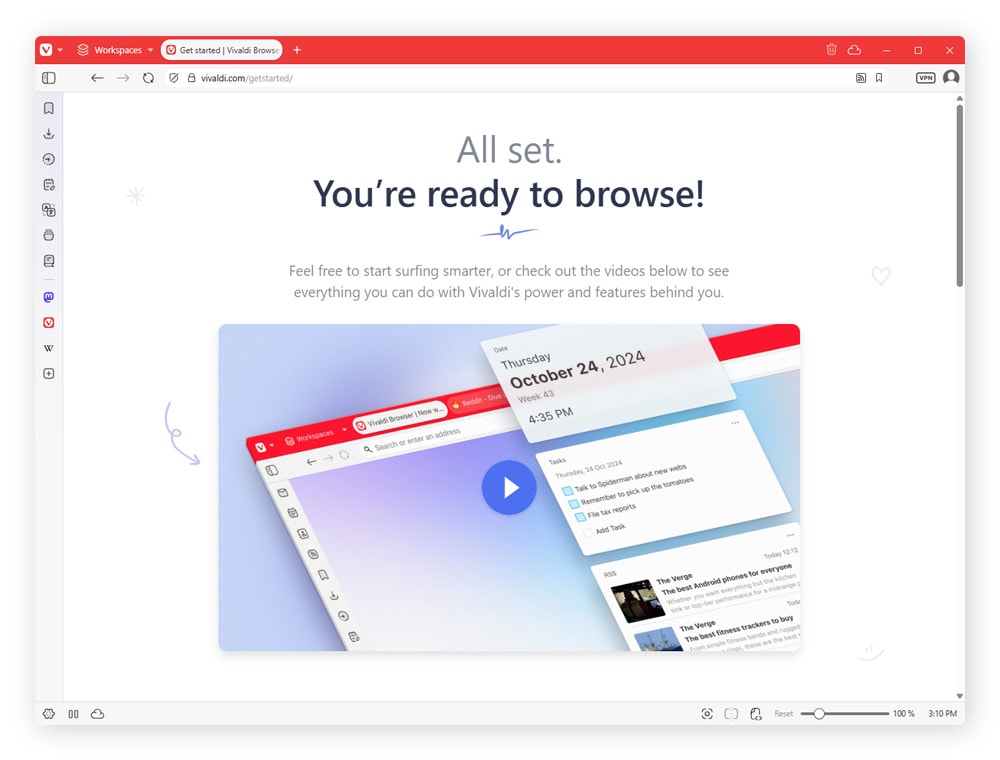

LibreWolf
LibreWolf is a privacy-focused fork of Firefox that strips out Mozilla’s telemetry and enhances security by default. It’s built for users who want the familiar Firefox interface without background data collection. Out of the box, it blocks trackers, tightens privacy settings, and includes the uBlock Origin extension for powerful ad and script blocking.
LibreWolf’s key features
- Blocks trackers.
- Block ads.
- Offers anti-fingerprinting protection.
- Automatically deletes cookies on close.
- Disables search and form history.
- Strips tracking elements from URLs.
- Offers HTTPS-only mode.
- Is open-source.
Disadvantages: LibreWolf is not available on mobile.
LibreWolf is available on Linux, Mac, and Windows, as well as more niche operating systems like Arch Linux, Debian, Gentoo, Fedora, and openSUSE.
What to look for in a private browser
A good private browser limits how much information about your digital life is exposed online, without significantly compromising performance. While some convenience trade-offs are inevitable, the best secure browsers strike a balance, using a range of tools, features, and secure default settings to help keep your activity private and your data protected.
Meet Norton Neo: Your new AI browser
Built from the ground up with AI, Norton Neo doesn’t just browse — it thinks. Blending smart navigation, conversational AI, and classic search, Neo is the vanguard of the AI revolution. Explore tomorrow's browser, today.
Ad blocking
All good private browsers should include an ad blocker. Ad-blocking features help prevent ads, including malicious ones known as malvertising, from loading on the sites you visit. This reduces data usage, speeds up page loading times, eliminates distractions, and lowers your risk of threats embedded in ads.
Tracker blocking
A proper private browser should stop cookies and other third-party trackers from following you around the internet and collecting data about your browsing behavior. This helps prevent advertisers, analytics companies, social media platforms, and others from building a profile on you through internet tracking techniques.
Anti-fingerprinting
This feature blocks websites from collecting your digital fingerprint — a unique combination of details like your browser type, installed fonts, extensions, operating system, screen resolution, language, and other settings. Even if you clear cookies or use incognito mode, this fingerprint can still be used to track you across the web and build a profile of your digital identity.


Increasingly, marketers are turning to fingerprinting, over cookies, to profile and track users. But unlike cookies, fingerprinting doesn’t require your consent. A good private browser conceals or randomizes the information used to compile your digital fingerprint, helping you stay more anonymous online.
A VPN
A VPN encrypts your internet traffic, hides your online activity, and masks your IP address by routing your connection through a private server — often in another country. This helps you stay anonymous online, access content more freely, and protect your data on public Wi-Fi. Some private browsers include a built-in VPN for seamless privacy, while others offer it as a separate but integrated tool for enhanced security.
Norton offers a private browser and a VPN as separate products, designed to work seamlessly together to enhance your privacy. As a pioneer in cybersecurity, Norton is a brand trusted by millions to help protect their online privacy and security. Get Norton VPN today for up to 10 devices with just one subscription to protect the whole family.
Anti-phishing protection
The best secure browsers don’t just protect your privacy; they also defend against cyberthreats like phishing. Anti-phishing tools help identify harmful links and block malicious websites that aim to steal your sensitive information, keeping you safer from identity theft and accidental malware downloads.
HTTPS enforcement
Some private browsers attempt to force all websites to use HTTPS (secure connection) over HTTP. This helps prevent man-in-the-middle attacks, where attackers intercept or alter your data — especially critical when entering sensitive details like passwords. Many also support DNS over HTTPS (DoH), which encrypts DNS queries to further protect your browsing data from eavesdropping or tampering.
Optional script-blocking
Some private browsers allow you to block certain scripts — small programs that run on websites. While most scripts are harmless and essential for a website’s functionality, some are designed to harvest browser data to track your activity and serve you targeted ads. Disabling them can enhance privacy, although this may prevent certain websites from functioning properly.
URL parameter stripping
This private browsing feature removes unnecessary and intrusive parameters often added to URLs by companies like Google or Facebook to monitor your activity.
To see this in action, search for something in a regular browser and click a result. Now look at the URL. It may include a long string of numbers, letters, and symbols beyond the actual webpage address. These extra characters transmit data about your browsing habits, including the search terms you used to reach the site. Removing them enhances privacy without breaking most website features.
Minimal telemetry
Telemetry refers to the data a browser collects and sends back to its developers for performance monitoring, debugging, or feature improvements. Some telemetry is harmless, but excessive data collection can compromise privacy. Private browsers should collect only the essentials, or even let users opt out entirely.
Other valuable features
The list above isn’t exhaustive. Other valuable private browser features include the ability to choose which search engine to use. And if you want faster, more responsive browsing, look for a lightweight design.
You’ll also want to make sure you use a browser from a reputable brand that offers regular updates, is highly customizable, and doesn’t require dozens of permissions to function.
Test your browser’s privacy
When it comes to protecting your digital privacy, you don’t have to take secure browsers at their word. Several websites allow you to check what information your browser may be leaking:
- Cover Your Tracks by the Electronic Frontier Foundation helps you test how well your browser is protecting you from tracking and fingerprinting.
- PrivacyTests.org conducts open-source testing of a web browser’s privacy and compiles its findings in detailed tables.
- Browser Leaks offers a range of tools and tests to evaluate how private and secure your browser is.
- IP Leak shows whether your IP address is visible and summarizes the various types of data your browser might be exposing to third parties.
- Am I Unique reveals whether your digital fingerprint is unique to you or shared with others. The more unique your fingerprint is, the less anonymous your browsing becomes.
- WhoTracks.me reveals which organizations are tracking you online, based on data from a huge open-source tracker database.
Private browsers vs. incognito mode
A private or secure browser is not the same as incognito mode, although the two are often confused, not least because incognito mode is sometimes referred to as “private browsing.”
True private browsers offer stronger privacy and security features than a regular browser’s incognito option. Private browsers block third-party trackers, limit digital fingerprinting, and help keep your activity private from websites, advertisers, and even some network observers. These protections operate continuously, not just in temporary sessions.
Incognito mode, by contrast, is much more limited. This feature merely stops your browsing history and cookies from being saved locally on your device once you close the window. It’s useful if you want to keep your activity private from others on the same device — for example, checking your email on someone else’s computer — but it doesn’t stop websites or advertisers from seeing what you’re doing online.
For anyone serious about online privacy and security, a true private browser is a must-have.
Browse the web more securely with Norton Private Browser
Tired of the massive amounts of data that mainstream browsers quietly collect and share? You’re not alone, and that’s why private browsers have become so popular. A more private, ad-free browsing experience can feel like a breath of fresh air. As a bonus, fewer junky ads mean faster, cleaner browsing.
Norton Private Browser puts you back in the driver’s seat by giving you greater control over what you share and who sees it. It not only boosts your privacy, but it also offers robust security features to ensure a safer browsing experience — for free.
FAQs
Is private browsing safe?
Yes, private browsing is safe, although it doesn’t neutralize all cyberthreats you could encounter online. Combining a private browser with a VPN and antivirus can provide even better protection and greater anonymity.
How do private browsers work?
Private browsers work by limiting the amount of personal data websites collect and share. They block third-party trackers, ads, and cookies, which helps prevent websites from gathering information about your online behavior.
Do private browsers hide my IP address?
Most private browsers won’t hide your IP address — at least not by default. To effectively conceal your IP address and encrypt your connection, you’ll usually need a VPN. While some private browsers come with an integrated VPN feature, most providers offer a VPN as a separate service.
What browser has the best privacy?
While no browser can guarantee complete privacy, Tor is often considered the most private option available. However, its enhanced privacy can make it less user-friendly, and many people find it too slow for their daily browsing needs. Other browsers, like Norton Private Browser, offer a more balanced experience, helping protect your privacy without inconveniencing you more than is strictly necessary.
Editorial note: Our articles provide educational information for you. Our offerings may not cover or protect against every type of crime, fraud, or threat we write about. Our goal is to increase awareness about Cyber Safety. Please review complete Terms during enrollment or setup. Remember that no one can prevent all identity theft or cybercrime, and that LifeLock does not monitor all transactions at all businesses. The Norton and LifeLock brands are part of Gen Digital Inc.




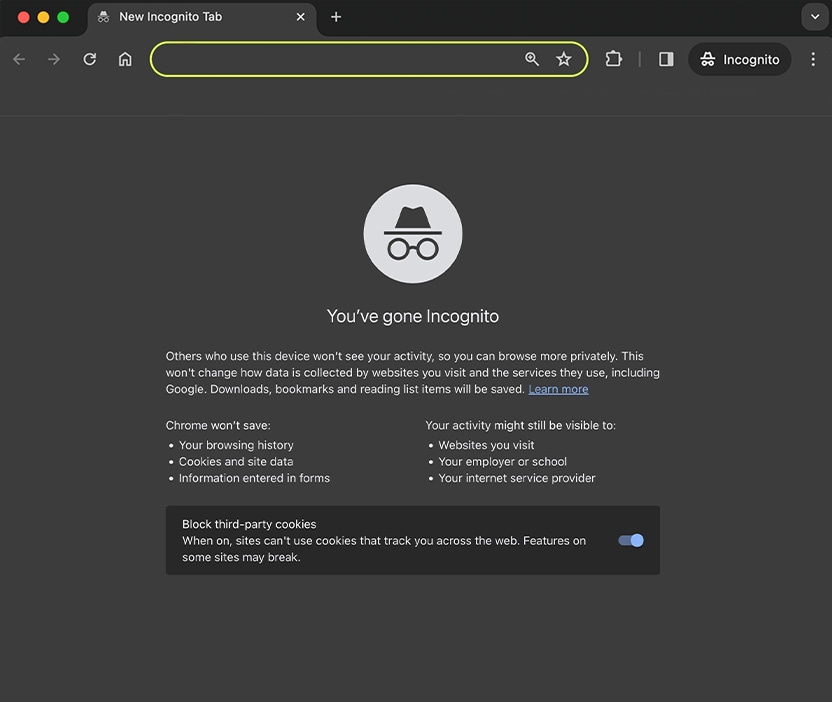


Want more?
Follow us for all the latest news, tips, and updates.